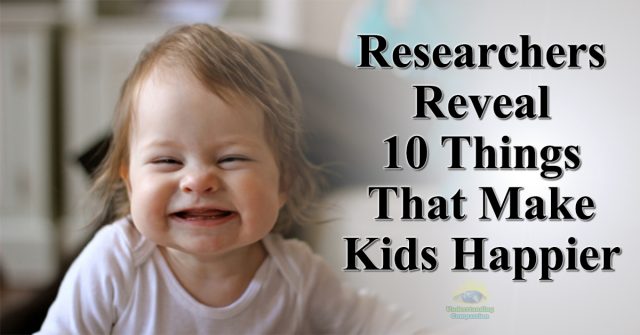Researchers Reveal 10 Things That Make Kids Happier
“One of the luckiest things that can happen to you in life is, I think, to have a happy childhood.”
~Agatha Christie
Childhood is a special time in one’s life. It is when we explore, discover and first get to know the world around us. For parents it is also a time of great enjoyment, but it comes with the care and concern of how to nurture and raise their child to be healthy, kind and happy.
Parenting is rarely always a smooth ride, but in our hearts we know that the child’s happiness always comes first.
Here are 10 scientifically proven tips to make kids happier:
1. GIVE THEM PLENTY OF PLAY TIME
Some might argue, but play time is essential in a child’s development. The primary responsibility of a child should be to play, for in this natural and healthy act they learn about both themselves and the world around them. Peter Gray, a child psychologist and professor at Boston College states, “Children learn the most important lessons in life from other children, not from adults…they cannot learn, or are much are much less likely to learn, in interactions with adults.”
So let them play while they’re still young.
2. TAKE ARGUMENTS AND HEAVY DISCUSSIONS ELSEWHERE
The brain of a child develops at an amazingly fast rate during early childhood. When they see and hear their parent’s adult-like problems, the child’s delicate psychological state can really be negatively affected; potentially creating feelings of worry, stress and fear, which can lead them to feel emotionally insecure even into adulthood.
Take the precious time to talk with your partner and both decide together to create a new habit of handling adult conversations in a place away from your young and still developing child.
3. DON’T COMPARE THEM TO OTHERS
Our highly competitive society would have us believe that children should be taught to be competitive from an early age, and that comparing them to others could be a possible way to do this. Yet competition is not a natural response of a young a pure-hearted child, as their kind hearts usually prefer to help and share with others rather than be seen as better than them.
Sometimes, adults will also point out desirable behavior and personality traits in another child, hoping to have their child copy them.
Yet researchers found that such comparative tendencies can adversely affect a child’s confidence and sense of self.
4. TEACH THE BENEFITS OF NEGATIVE EMOTIONS
Children live with open and honest hearts, and when they feel something, showing it is a natural response. It’s normal for children to have spontaneous outbursts of anger, envy, or sadness. This behavior presents a wonderful time to be a good parent as world famous psychologist Dr. John Gottman explains:
Dr. John Gottman at the University of Washington cites the popular tendency of adults to address a child’s perceived “misbehavior” – their ‘negative emotions’ – by punishing them in some form.
This can actually teach the child that their natural feelings are not normal and not okay, and can lead them to suppress these feelings without considering their causes or understanding them; a habit we know later on in life leads to suffering and so many different types of emotional disorders.
Gottman says that a better way to handle this situation that will help the child develop into a happy and healthy adult is to acknowledge the behavior with the child, and to explain that everyone experiences negative emotions, and then help your loved child find ways to deal with their emotions constructively.
5. ACKNOWLEDGE THEIR EFFORTS
The child will understand that hard work is needed to receive what they want from life once they’ve reached a certain age, so it is recommended to encourage and recognize them when you notice them putting in this type of extra effort.
Dr. Carol Dweck at Stanford University says: “Our message to parents is to focus on the process the child engages in, such as trying hard or focusing on the task – what specific things they’re doing rather than ‘you’re so smart, you’re so good at this.”
6. LET THEM TAKE CHANCES
Our children do need supervision often, but it’s very common for parents to overdo it by keeping an eye on the child’s every move. Yet research shows that “overparenting” is counterproductive to a child’s development.
In an article published in the Journal of Psychologists and Counsellors in Schools, researchers write; “Does an extreme attentiveness to a child and their imagined needs and issues, encourage parents to reduce their demands on their child, resulting in the child rarely facing adverse situations, [rarely] learning to cope, and acquiring resilience, maturity, and other essential life skills? The current study raises the disturbing possibility that the answer is yes.”
7. VALUE FAMILY TRADITIONS
Stability within the home and in the family is an important need for a child, and having certain activities that the family regularly performs together can be wonderful for a child’s development.
According to the Child Development Institute, having regular family time brings these five main benefits:
- The child observes positive adult traits.
- The child feels important and loved.
- Adults can observe and learn more about their child’s weaknesses to guide them better.
- The child can verbalize their thoughts and feelings, and
- The parent and child develop a stronger bond.
8. GIVE CHILDREN A SENSE OF INDIVIDUAL RESPONSIBILITY
It is helpful to allow children to complete responsibilities, such as homework and daily chores, without micromanaging them.
According to child psychologists, an excessive amount of oversight can manifest into the child developing an “I can’t do this alone” attitude. While some attention, and even consequences, are necessary for a child to recognize the results of avoiding responsibility, overly supervising is not helpful.
9. CREATE HAPPY MEMORIES
A multi-experiment study completed by professors at Harvard University found that adults who recalled good childhood memories “(seemed) to summon a heightened sense of moral purity.”
Researchers observed that the participants “were more likely to help the experimenters with an extra task, judge unethical behavior harshly and donate money to charity when they had actively remembered their childhood.”
10. BE HAPPY YOURSELF
It’s well known that children learn from their parent’s example rather than their parent’s words. If an adult exhibits positive behavior, the child is more likely to reciprocate. According to Carolyn Cowan, a psychologist at the University of California: “children do not fare well if the adults aren’t taking care of themselves and their relationships.”
Therefore, it’s very important for parents to take the necessary steps to be happy and healthy themselves, as their children will seek to follow their example.
If you found this information helpful, please SHARE with your friends and family. Both you and your children are deeply loved.


















